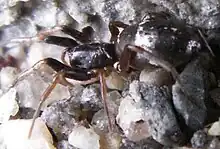| Micaria pulicaria | |
|---|---|
 | |
| Scientific classification | |
| Domain: | Eukaryota |
| Kingdom: | Animalia |
| Phylum: | Arthropoda |
| Subphylum: | Chelicerata |
| Class: | Arachnida |
| Order: | Araneae |
| Infraorder: | Araneomorphae |
| Family: | Gnaphosidae |
| Genus: | Micaria |
| Species: | M. pulicaria |
| Binomial name | |
| Micaria pulicaria | |
| Synonyms[1] | |
| |
Micaria pulicaria, the glossy ant spider,[2] is a species of ground spider from the family Gnaphosidae with a Holarctic distribution.[1]
Description
The cephalothorax is glossy black, although less iridescent than the opisthosoma, and marked with radiating white lines. The abdomen is very iridescent and shows two parallel, white lines across the prosoma, with three dots in a line along the posterior portion of the prosoma. The femora on legs I and II are black, while those on legs III and IV are dark brown. The body length of the females is 2.7–4.5 mm while for males it is 3–3.5 mm.[3]
Biology
Micaria pulicaria is not ant hunting, although it associates with ants,[4] and it quivers its front legs to mimic ant antennae which may help prevent it falling prey to those larger spiders which generally avoid contact with ants. The females enclose the eggs within a stiff sac resembling a rimmed pot and although she does not guard them, she does return frequently to check it. The adults have been recorded from early February to late November, although they may occur throughout the year. The main season is from late spring until mid-summer.[5]
Habitat
Micaria pulicaria is found at ground level in a wide variety of habitats, although showing a marked preference for sandy sites.[6] The preferred habitat has scattered stones or small beds of stones. In Great Britain it has been recorded from the warm, sunny parts of sandy heaths, chalk downlands, dunes and derelict land, but it has also been found in saltmarsh, sphagnum filled dune slacks, mossy areas in broad-leaved woodland as well as the expected stony, bare, dry habitats.[5]
Distribution
Micaria pulicaria has a Holarctic distribution.[1] In Europe it is found throughout, including Ireland and Iceland.[7] In countries with good recording schemes, such as Great Britain, Denmark and the Czech Republic, the species is recorded as frequent and widespread.[3][5][8]
References
- 1 2 3 4 "Micaria pulicaria (Sundevall, 1831)". World Spider Catalog. Natural History Museum Bern. Retrieved 28 September 2016.
- ↑ "Micaria pulicaria". Stefan Sollfors. Retrieved 29 September 2016.
- 1 2 "Micaria pulicaria (Sundevall, 1831) (Glossy ant-spider)". University of Copenhagen/Natural History Museum, Aarhus. Retrieved 29 September 2016.
- ↑ "A spider in ant disguise". Blackbird. Retrieved 29 September 2016.
- 1 2 3 "Summary for Micaria pulicaria (Araneae)". British Arachnological Society. Retrieved 29 September 2016.
- ↑ "Micaria pulicaria (Sundevall, 1831)". Trevor and Dilys Pendleton. Retrieved 29 September 2016.
- ↑ "Micaria pulicaria (Sundevall, 1831)". Nentwig W, Blick T, Gloor D, Hänggi A, Kropf C: Spiders of Europe. www.araneae.unibe.ch. Retrieved 29 September 2016.
- ↑ "Micaria pulicaria (Sundevall, 1831)". Czech Arachnological Society. Retrieved 29 September 2016.